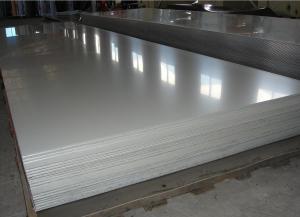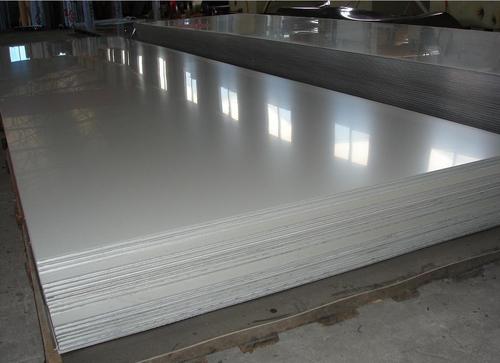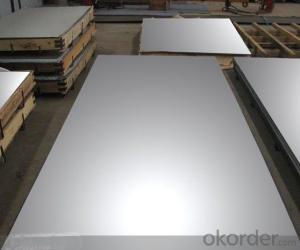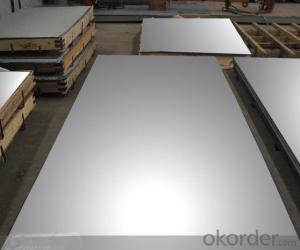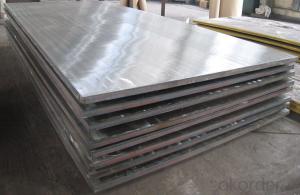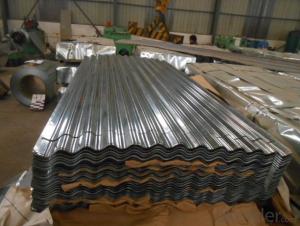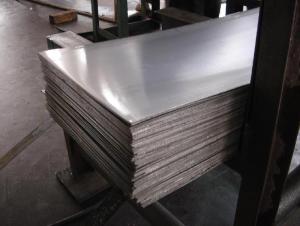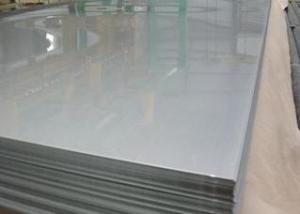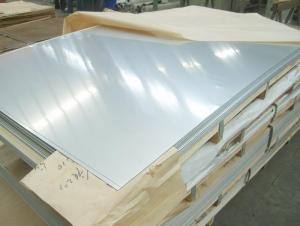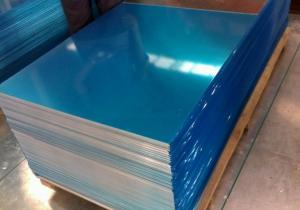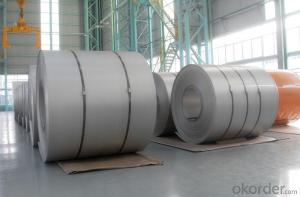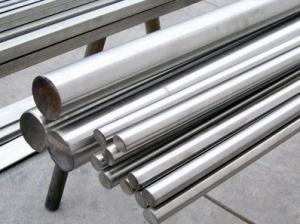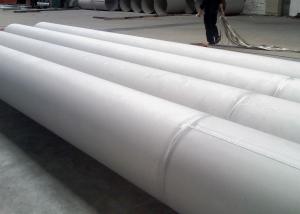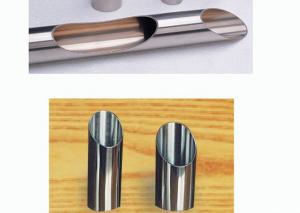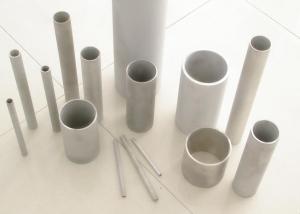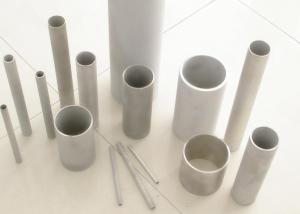430 cold rolled stainless steel sheet
- Loading Port:
- Shanghai
- Payment Terms:
- TT OR LC
- Min Order Qty:
- -
- Supply Capability:
- 2000 m.t./month
OKorder Service Pledge
Quality Product, Order Online Tracking, Timely Delivery
OKorder Financial Service
Credit Rating, Credit Services, Credit Purchasing
You Might Also Like
grade | 430 |
surface | 2B |
thickness | 1MM, |
width | 1200MM,1220MM,1500MM,ETC. |
length | 2400MM,2440MM,3000MM,ETC. |
Payment terms | T/T, or L/C. |
Delivery time | Normally within 1 weeks after get your deposits. |
package | Standard export package, normally with wooden pallets |
MOQ | 5 tons/each size |
- Q: What is the elongation of stainless steel sheets?
- The elongation of stainless steel sheets refers to the ability of the material to stretch or deform under tension before breaking. It is typically expressed as a percentage and represents the maximum strain the steel can undergo without fracturing.
- Q: Can stainless steel sheets be used for storage containers?
- Yes, stainless steel sheets can be used for storage containers. Stainless steel is a durable and corrosion-resistant material that is commonly used in various industries, including food and beverage, pharmaceuticals, and chemical storage. Its ability to withstand high temperatures, resist rust and stains, and its non-reactive nature make it an ideal material for storage containers. Stainless steel sheets can be fabricated into containers of various sizes and shapes, providing a secure and hygienic storage solution for a wide range of products. Additionally, stainless steel is easy to clean and maintain, ensuring the longevity and cleanliness of the storage containers.
- Q: What are the advantages of using stainless steel sheets?
- Using stainless steel sheets in various applications offers several benefits. First and foremost, stainless steel is renowned for its outstanding resistance to corrosion. It is highly effective in preventing rust and stains, making it an ideal option for environments where moisture and corrosive substances are present. This exceptional durability ensures that stainless steel sheets maintain their aesthetic appeal and structural integrity over time. Furthermore, stainless steel is exceptionally strong and durable. It possesses a high tensile strength, enabling it to withstand heavy loads and resist deformation. This makes stainless steel sheets perfect for applications that require robustness, such as construction, automotive, and industrial projects. Additionally, stainless steel is sanitary and easy to clean. Its non-porous surface prevents the growth of bacteria and other microorganisms, making it a popular choice for food processing equipment, medical tools, and healthcare facilities. Moreover, stainless steel sheets are simple to maintain, as they can be easily wiped clean or sterilized without causing any damage to the material. Moreover, stainless steel sheets offer both versatility and aesthetic appeal. They feature a sleek and modern appearance that can enhance the visual appeal of architectural designs, interior decorations, and kitchen appliances. With a variety of finishes available, including brushed, mirror, or textured, stainless steel sheets can be customized to suit specific design preferences. Lastly, stainless steel is an environmentally friendly material. It is 100% recyclable, meaning it can be reused and repurposed without any loss in quality or performance. This makes stainless steel sheets a sustainable choice, reducing the necessity for new raw materials and minimizing waste. In conclusion, the benefits of using stainless steel sheets include exceptional corrosion resistance, strength and durability, hygienic properties, aesthetic appeal, and environmental sustainability. These characteristics make stainless steel sheets a versatile and dependable choice for a wide range of applications.
- Q: How do you prevent fingerprints or smudges on stainless steel sheets?
- To prevent fingerprints or smudges on stainless steel sheets, it is important to regularly clean and maintain the surface. Use a soft, lint-free cloth and mild detergent to gently wipe the stainless steel, following the grain. Avoid using abrasive cleaners or scrubbing pads as they can cause scratches. Additionally, applying a stainless steel cleaner or polish can create a protective barrier and enhance the resistance to fingerprints.
- Q: Can stainless steel sheets be used for exterior cladding?
- Yes, stainless steel sheets can be used for exterior cladding. Stainless steel is highly resistant to corrosion, making it suitable for outdoor applications. It is durable, long-lasting, and provides an attractive aesthetic for building exteriors.
- Q: Are stainless steel sheets resistant to lactic acid?
- Yes, stainless steel sheets are generally resistant to lactic acid. Stainless steel is known for its corrosion resistance, and lactic acid is not typically strong enough to cause significant damage to stainless steel surfaces. However, the resistance may vary depending on the specific grade and quality of stainless steel used. It is always recommended to consult with a material expert or conduct proper testing to ensure the suitability of stainless steel sheets for specific applications involving lactic acid.
- Q: Are stainless steel sheets recyclable?
- Yes, stainless steel sheets are recyclable. Stainless steel is one of the most recyclable materials in the world, and its properties allow it to be recycled repeatedly without losing its quality or durability.
- Q: Can stainless steel sheets be used for medical implant devices?
- Yes, stainless steel sheets can be used for medical implant devices. Stainless steel is a widely used material in the medical industry due to its excellent mechanical properties, corrosion resistance, and biocompatibility. It is known for its strength, durability, and ability to withstand sterilization processes. Stainless steel sheets can be fabricated into various medical implant devices such as plates, screws, and pins used in orthopedic surgeries, dental implants, cardiovascular devices, and many others. The high strength-to-weight ratio of stainless steel makes it suitable for load-bearing applications, while its resistance to corrosion ensures longevity within the body. Furthermore, stainless steel is a biocompatible material, which means it is well-tolerated by the human body and does not cause adverse reactions or allergies. The surface of stainless steel can be modified to enhance its biocompatibility by processes like passivation or coating. It is important to note that the selection of the appropriate stainless steel grade and surface finish is crucial for medical implant devices to ensure compatibility with the specific body tissue and environment. Additionally, thorough testing and regulatory approval are required to ensure the safety and efficacy of stainless steel medical implant devices. In conclusion, stainless steel sheets can indeed be used for medical implant devices due to their mechanical properties, corrosion resistance, and biocompatibility. Proper selection, testing, and regulatory approval are essential to ensure the suitability and safety of stainless steel implants in medical applications.
- Q: Are stainless steel sheets suitable for food processing and storage?
- Stainless steel sheets are incredibly well-suited for food processing and storage. The food industry favors stainless steel for its multitude of advantages. To begin with, stainless steel is a non-reactive material, guaranteeing that it won't release any harmful chemicals or flavors into the food. This attribute makes it perfectly safe for storing and processing all sorts of food, including those with acidic or alkaline components. Furthermore, stainless steel is highly resistant to corrosion and rust, ensuring that the food products remain hygienic and last for a long time. Additionally, stainless steel boasts exceptional heat resistance, enabling it to endure high temperatures during cooking and processing without bending or distorting. Its smooth and non-porous surface also makes it effortless to clean and maintain. This is particularly crucial in food processing facilities where cleanliness and hygiene are of utmost importance. Moreover, stainless steel is a durable material that can withstand heavy use and frequent cleaning. It resists impact, staining, and scratching, making it the perfect choice for food processing equipment and storage containers that undergo regular wear and tear. In conclusion, stainless steel sheets are highly suitable for food processing and storage due to their non-reactive nature, corrosion resistance, heat resistance, ease of maintenance, and durability. They offer a safe and hygienic environment for food processing, ensuring the quality and integrity of the food products.
- Q: Are stainless steel sheets easy to clean?
- Yes, stainless steel sheets are easy to clean. They have a smooth surface that is resistant to stains and can be easily wiped clean with soap and water. Additionally, they are also resistant to rust and corrosion, making them low-maintenance and suitable for various applications.
Send your message to us
430 cold rolled stainless steel sheet
- Loading Port:
- Shanghai
- Payment Terms:
- TT OR LC
- Min Order Qty:
- -
- Supply Capability:
- 2000 m.t./month
OKorder Service Pledge
Quality Product, Order Online Tracking, Timely Delivery
OKorder Financial Service
Credit Rating, Credit Services, Credit Purchasing
Similar products
Hot products
Hot Searches
Related keywords
